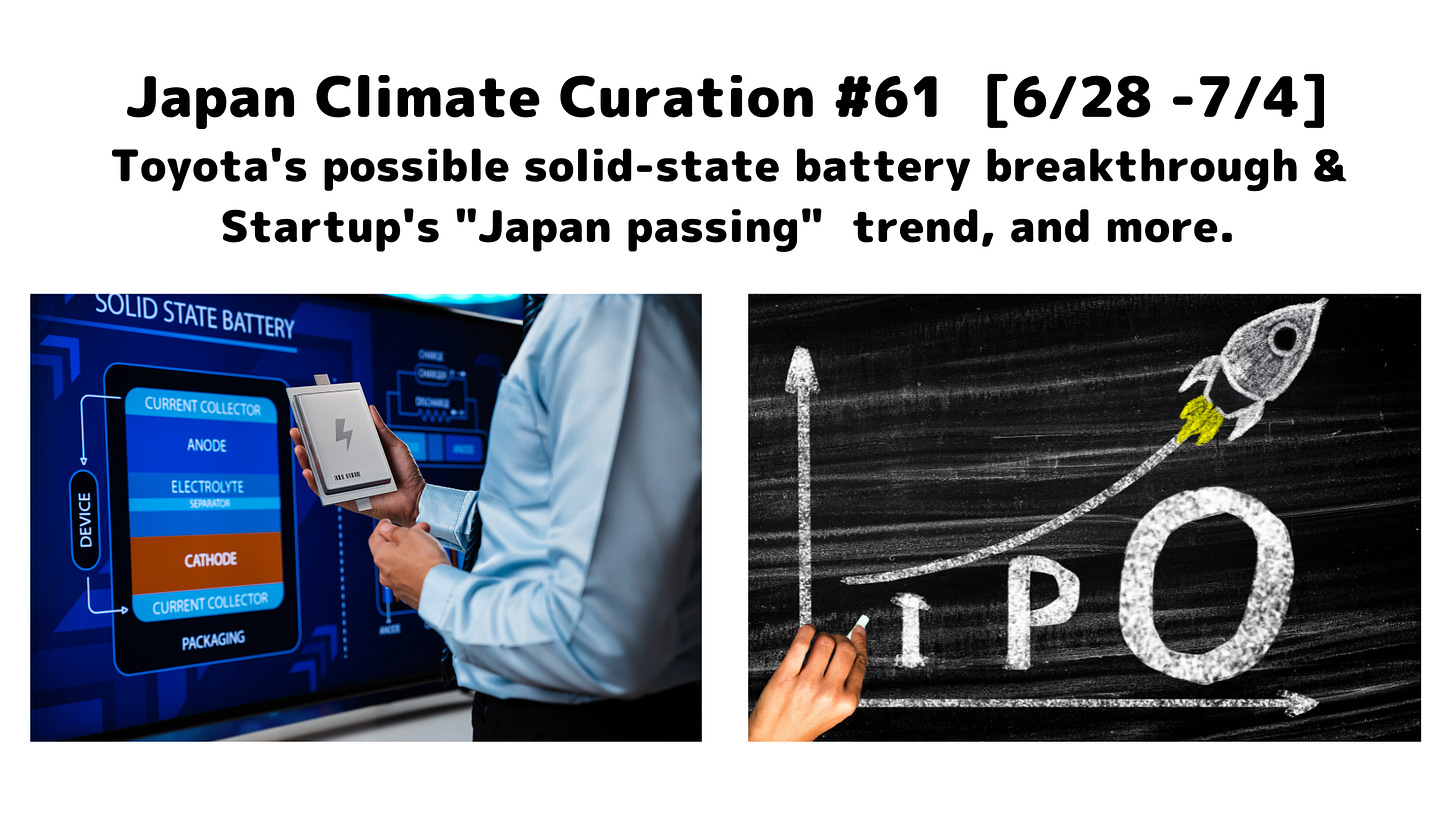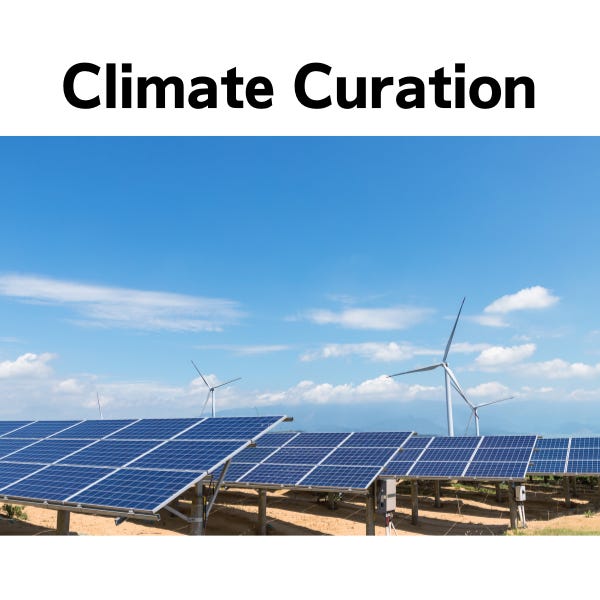Toyota's possible solid-state battery breakthrough & Startup's "Japan passing" trend, and more.
*Editor’s note: This article was originally published on 7/4/2023 on Linkedin.
Welcome! I'm Hiroyasu Ichikawa, ichi, and this is issue 61 of the "Japan Climate Curation" newsletter📬, which curates Japan-related climate news content every week since spring 2022. You can subscribe by clicking on the Linkedin page, or via the form below.
Eleven news articles were curated this week, covering topics such as Toyota's possible solid-state battery breakthrough, startup's "Japan passing" trend, offshore wind power, Fukushima's treated water, and more.
I hope you find the list of articles below useful for reading (or skimming)!
[Note]: I am available to offer my research and consulting services for your Japan-related climate or net-zero business. The first 30 minutes of Zoom chat is free, and I could work at an hourly rate starting at $50. Please fill out your request using this link. Thank you!
[🇯🇵📰👀Japan Climate News Headlines]
【1】Toyota says solid-state battery breakthrough can halve cost and size [7/4 Financial Times]
Toyota has made a breakthrough in solid-state battery technology, aiming to halve EV batteries' size, weight, and cost. The new tech is expected to solve EV battery issues like capacity and fire risk.
Toyota aims to launch this in an EV by 2027, promising a 1,200 km range and rapid charging time. Analysts say this could be a game-changer for the automaker.
【2】Japan startups snub Tokyo exchange for Nasdaq IPOs [6/28 Nikkei Asia]
Japanese startups like Syla Technologies favor Nasdaq over the Tokyo Stock Exchange for their IPOs in search of more tech-friendly investors. American investors' openness to novel services and technologies is driving this shift.
Syla Technologies, a real estate crowdfunding platform, raised $15m, reflecting a successful US market entry. As more startups follow this trend, concerns grow around "Japan passing," with Japanese entrepreneurs increasingly looking overseas.
【3】♻️ JEPLAN, a Tokyo, Japan-based PET chemical recycling provider, announced a SPAC merger with AP Acquisition Corp [6/16 Market Screener]
JEPLAN, Inc. is set to list on the NYSE via a merger with AP Acquisition Corp, valuing JEPLAN at $300 million. The projected gross proceeds of $180 million will be used to boost JEPLAN's r-PET resin production capacity.
The deal, slated to close in late 2023, will lead to the formation of "JEPLAN Holdings, Inc.", poised to expand JEPLAN's technology globally.
【4】TDK Ventures, a San Jose, CA-based investment firm, has launched a new $150M fund to invest in European and North American-based energy transition startups. [6/19 PR Newswire]
TDK Ventures selected London for its first European office
New $150-million (USD) multi-limited-partner Fund EX1 (EX = energy transformation) will focus on both European and North American-based electrification and decarbonization startups
TDK Ventures' mission and values to invest in climate tech startups align with Europe's ambitious goals to reduce greenhouse gas emissions by 50% and reach net-zero emissions by 2050
【5】Factbox: Japan aims to become major offshore wind energy producer [7/1 Reuters]
Japan aims to be a significant offshore wind energy producer, with ambitions to have up to 45 GW operational by 2040.
After launching the country's first large-scale commercial wind operations, Japan has now concluded a second round of tenders for 1.8 GW of capacity across four areas. The government is also creating a roadmap for floating offshore wind power.
【6】Explainer: How Japan plans to release Fukushima water into the ocean [7/4 Reuters]
Japan plans to release over a million tonnes of treated Fukushima nuclear plant water into the ocean, a process that will span decades. The remaining tritium in the water considered relatively harmless, has raised concerns due to potential cancer risks.
The company Tepco has launched efforts to lessen reputational damage. Despite these efforts, local fisheries and neighboring countries, including China, have criticized the move.
【7】Colourful facade hides flaws in Japan’s ‘green’ waste policy [7/3 Financial Times]
Japan's waste policy, touted as 'green'’ largely relies on burning rubbish for electricity generation under the guise of recycling. Despite having one of the highest plastic recycling rates, it incinerates about 78% of its household waste.
While efficient and a seeming solution to Japan's single-use plastic issue, this approach raises concerns over greenhouse gas emissions. Furthermore, Japan's model is being adopted by Southeast Asian countries facing waste management issues.
【8】Companies tap Niigata prefecture’s traditional sustainability [7/3 Financial Times]
Niigata-based company Biomass Resin Holdings converts unsuitable rice into low-carbon plastic, a strategic response to falling rice consumption and a heavy national reliance on petroleum-based plastic.
The startup intends to produce 5% of Japan's biomass plastic usage by 2030. They're expanding their factories nationwide and in Southeast Asia. Additionally, Niigata utilizes ancient snow cellars, known as "yukimuro," as natural refrigerators, further contributing to sustainability efforts.
【9】Japanese industry steps up ammonia push in efforts to cut CO₂ [7/2 Financial Times]
Japanese conglomerate IHI is turning to ammonia as a low-carbon fuel, aligning with Japan's national hydrogen strategy. Despite setbacks, IHI is committed to introducing ammonia-powered turbines by 2025. The approach has yet to pique investor interest in the way liquid hydrogen has.
【10】Japan’s EV ambitions pose battery recycling conundrum [7/2 Financial Times]
Toyota's ambitious EV strategy, aiming to sell 3.5mn units by 2030, underlines Japan's broader challenges in achieving sustainable battery production. As the global community strives to reduce reliance on China's dominating battery supply chain, Japan aims to increase its domestic lithium-ion battery production drastically.
Companies like Panasonic are innovating with cobalt-free batteries and significant recycling initiatives. However, to meet the rising demand for EVs, Japan must maintain ties with China and pursue disruptive technologies.
【11】Opinion| Mr. Kim Schumacher | Japan Inc must do more to reduce greenwashing risks [7/3 Financial Times]
Japan's integration of sustainability and ESG principles into corporate and financial sectors is inconsistent, leading to risks of "greenwashing" - claiming unwarranted green credentials - and "competence greenwashing" due to a lack of skilled personnel.
Japan's Financial Services Agency needs credible sustainability and ESG expertise. More robust evidence supporting sustainability or ESG-related claims is needed to reduce greenwashing risks.
📬That's all for this week! Thank you for reading(or skimming) 🙇. I hope you will have a wonderful week ahead!
"Climate Curation" newsletter in 🇯🇵Japanese (every Saturday)
Please feel free to contact me (via DM or email ) if there are any research/consulting needs for your business or just for a coffee chat☕.
My personal Twitter account (in 🇯🇵Japanese) @SocialCompany
ichi (Hiroyasu Ichikawa)





